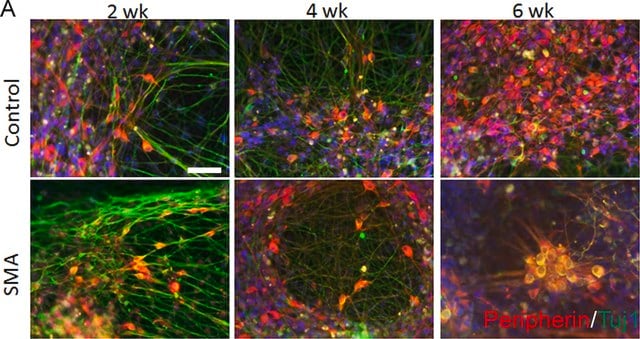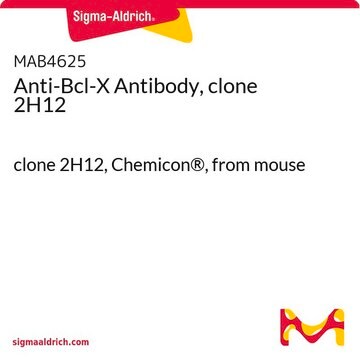AB9282
Anti-Peripherin Antibody
Chemicon®, from chicken
Synonym(s):
Anti-NEF4, Anti-PRPH1
Sign Into View Organizational & Contract Pricing
All Photos(1)
About This Item
UNSPSC Code:
12352203
eCl@ss:
32160702
NACRES:
NA.41
clone:
polyclonal
application:
ICC
WB
WB
species reactivity:
rat
technique(s):
immunocytochemistry: suitable
western blot: suitable
western blot: suitable
citations:
6
Recommended Products
biological source
chicken
Quality Level
antibody form
purified immunoglobulin
antibody product type
primary antibodies
clone
polyclonal
species reactivity
rat
manufacturer/tradename
Chemicon®
technique(s)
immunocytochemistry: suitable
western blot: suitable
NCBI accession no.
UniProt accession no.
shipped in
dry ice
target post-translational modification
unmodified
Specificity
Peripherin.
Immunogen
Recombinant full length peripherin.
Application
Detect Peripherin using this Anti-Peripherin Antibody validated for use in WB & IC.
Research Category
Neuroscience
Neuroscience
Research Sub Category
Sensory & PNS
Neuronal & Glial Markers
Sensory & PNS
Neuronal & Glial Markers
Western blot: 1:5,000-1:10,000. The antibody reacts with the ~57 kDa peripherin protein.
Immunocytochemistry: 1:500-1:1,000
Optimal working dilutions must be determined by the end user.
Immunocytochemistry: 1:500-1:1,000
Optimal working dilutions must be determined by the end user.
Physical form
Chicken IgY. Liquid containing ~10 mM sodium azide.
Format: Purified
Storage and Stability
Maintain at -20°C in undiluted aliquots for up to 6 months after date of receipt. Avoid repeated freeze/thaw cycles.
Analysis Note
Control
POSITIVE CONTROL: Rat spinal cord or peripheral nerve homogenate.
POSITIVE CONTROL: Rat spinal cord or peripheral nerve homogenate.
Legal Information
CHEMICON is a registered trademark of Merck KGaA, Darmstadt, Germany
Disclaimer
Unless otherwise stated in our catalog or other company documentation accompanying the product(s), our products are intended for research use only and are not to be used for any other purpose, which includes but is not limited to, unauthorized commercial uses, in vitro diagnostic uses, ex vivo or in vivo therapeutic uses or any type of consumption or application to humans or animals.
Not finding the right product?
Try our Product Selector Tool.
recommended
Product No.
Description
Pricing
Storage Class Code
12 - Non Combustible Liquids
WGK
WGK 2
Flash Point(F)
Not applicable
Flash Point(C)
Not applicable
Certificates of Analysis (COA)
Search for Certificates of Analysis (COA) by entering the products Lot/Batch Number. Lot and Batch Numbers can be found on a product’s label following the words ‘Lot’ or ‘Batch’.
Already Own This Product?
Find documentation for the products that you have recently purchased in the Document Library.
Dvir Blivis et al.
Scientific reports, 9(1), 3201-3201 (2019-03-03)
We investigated dye-coupling between motoneurons in the L6 segment of the neonatal mouse spinal cord that contains limb-innervating motoneurons and sexually dimorphic motor nuclei. Using an isolated spinal cord preparation, we back-filled the cut, L6 ventral root with the small
Nancy E J Berman et al.
Headache, 46(8), 1230-1245 (2006-09-01)
We examined changes in the serotonin system across the estrous cycle in trigeminal ganglia of female rodents to determine which components are present and which are regulated by the variations in levels of ovarian steroids that occur during the estrous
Deepthi Thomas et al.
International journal of physiology, pathophysiology and pharmacology, 12(6), 153-165 (2021-01-28)
Electrical synapses formed by gap junctions occur at a variety of neuronal subcellular sites in the mammalian central nervous system (CNS), including at somatic, dendritic and axon terminal compartments. Numerous electrophysiological studies using mice and rats, as well as computer
Marián Haburčák et al.
Frontiers in synaptic neuroscience, 14, 995474-995474 (2022-10-18)
The Spontaneously Hypertensive Rat (SHR) has increased sympathetic drive to the periphery that precedes and contributes to the development of high blood pressure, making it a useful model for the study of neurogenic hypertension. Comparisons to the normotensive Wistar Kyoto
Prabhisha Silwal et al.
International journal of physiology, pathophysiology and pharmacology, 16(3), 55-76 (2024-07-18)
Sexually dimorphic spinal motoneurons (MNs) in the dorsomedial nucleus (DMN) and dorsolateral nucleus (DLN) as well as those in the cremaster nucleus are involved in reproductive behaviours, and the cremaster nucleus additionally contributes to testicular thermoregulation. It has been reported
Our team of scientists has experience in all areas of research including Life Science, Material Science, Chemical Synthesis, Chromatography, Analytical and many others.
Contact Technical Service








